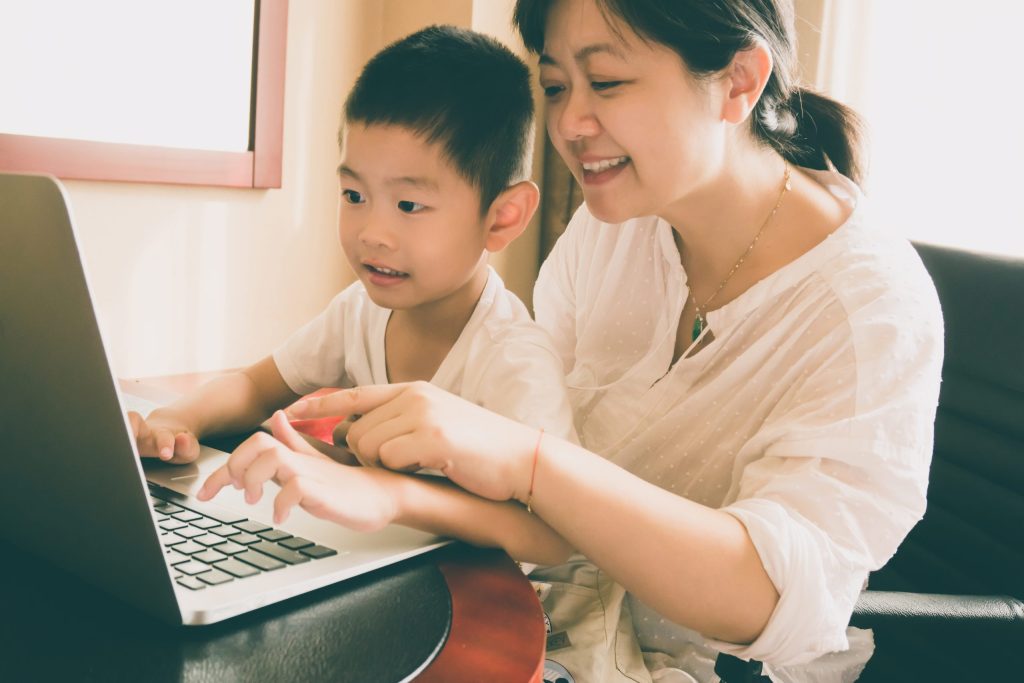The Chinese approach to digital parenting: The Mum Jury experiment in Beijing
by Jian Xu and Xinyu (Andy) Zhao, Deakin University
How parents can help children develop healthy digital habits has become an increasingly important issue worldwide. In China, the government has addressed this challenge by introducing the Mum Jury experiment in Beijing. This model innovatively bridges the domains of internet governance and digital parenting by strategically mobilising maternal labour as an intermediary between the state and families. The Chinese approach to digital parenting allows us to critically examine the growing role of the state in digital parenting practices, as well as the possibility of theorising digital parenting as a form of internet governance, both of which remain insufficiently studied in the global digital parenting literature.
“Mum Jury” (mama pingshentuan) is a non-governmental organisation (NGO) established in 2010 in Beijing. It was initiated by the Beijing Internet Association, a non-profit social organisation operating under the guidance and supervision of its administrative body – the Beijing Cyberspace Administration Office (BCAO), a provincial-level branch of the Cyberspace Administration of China (CAC). CAC is China’s leading internet regulatory authority. Mum Jury actively engages in efforts to address online content deemed harmful to children and participates in initiatives to prevent internet addiction among children. Hundreds of mothers in Beijing have been recruited through voluntary applications to support the initiative.
The Mum Jury operates as citizen watchdogs, monitoring and reporting harmful online content to regulatory authorities.
New members participate in training sessions to familiarise themselves with China’s internet governance policies and laws. Members dedicate their time to browsing the internet and identifying inappropriate content, such as online violence, pornography, horror, rumours, and vulgar material deemed harmful to minors. Members then report said content to the Beijing Reporting Platform for Illegal and Harmful Online Information. The mothers serve as grassroots supervisors and whistleblowers, actively participating in state-led internet regulation. Their efforts align with the government’s recurring internet regulatory campaigns, including initiatives against online rumours, efforts to “clean up” the internet, and crackdowns on pornography and illegal publications.
Most importantly, members of the Mum Jury are expected to serve as qualified “educators” in digital parenting, utilising knowledge gained from various trainings and activities to guide their children’s everyday internet usage. The organisation regularly hosts mother-child engagement activities, such as summer camps and interactive classes, to promote digital literacy of both parents and children. These education-through-entertainment activities are often co-organised with digital companies and feature talks from industry professionals and education specialists. Topics include online safety during school holidays, discerning credible online information, ethical social media usage, and strategies for responding to cyberbullying and online violence, among others.

As the first organisation of its kind in China, Mum Jury can be understood as a state-led experiment in what we call an “internet governance-cum-digital parenting” model. This model innovatively bridges the domains of internet governance and digital parenting by strategically mobilising maternal labour as an intermediary actor between the Chinese state and families. China’s approach to internet governance is characterised by a multilateral framework that prioritises cybersecurity and sovereignty and asserts a strong state-led regulatory role. This stands in contrast to the multistakeholder model favoured in many Western democracies, which emphasises collaborative participation across sectors (e.g., civil society and the private sector) and promotes decentralised, consensus-driven decision-making.
China is certainly not the only country in the world where the state intervenes in digital family life. Many governments have regulatory policies and agencies which govern internet companies and protect children’s digital rights, such as the Office of the eSafety Commissioner in Australia, the Age Appropriate Design Code in the UK and the General Data Protection Regulation (GDPR) in the European Union. While it is unusual to see organisations like Mum Jury in Western countries, there are non-profit organisations functioning similarly to the Mum Jury, including the Parent Zone in the UK and the Family Online Safety Institute in the US. However, the relations between these organisations and the state are different from those of the Mum Jury in China. Organisations such as FOSI and the Parent Zone are independent, acting as civil society agents and advising state legislatures and regulatory bodies. These organisations position themselves as the key intermediaries and authoritative sources of expertise for various stakeholders in digital parenting. They take the lead in initiating and maintaining a digital parenting ecosystem. In contrast, the Mum Jury is initiated and supervised by the government. The government plays a more directive role in setting up public agendas and goals in relation to digital parenting than other stakeholders.
The relationship with industry also differs significantly. The members of FOSI are from tech companies like Google, Microsoft, and Meta. These industry members provide financial support and advocate for industry self-regulation. The Mum Jury also plays such an intermediary role between the state and industry, but it mainly functions as a legitimacy broker, helping the government to oversee the industry in the name of protecting children, rather than fostering meaningful dialogue among the state, industry and civil society.
Parents are key beneficiaries and end users of FOSI and Parent Zone.
FOSI runs a Digital Parenting Program which offers a variety of educational blogs and tips to help families navigate the digital world with confidence. In addition, it gathers insights from parents via surveys to inform policymakers and industry partners. By contrast, the Mum Jury treats the mothers as regulatory labour at home and beyond. They are trained to become “governing parent-citizens”, performing dual roles in digital parenting and internet governance. In this sense, parents are no longer merely recipients of support and guidance but have become active participants in state-led initiatives. Fundamentally, Mum Jury and its counterparts reflect disparate assumptions and models of doing internet governance: “state-centric approach” in China versus “multi-stakeholder model” in Western contexts. While it is difficult to speculate whether the model of Mum Jury will be expanded, it indicates the Chinese government’s emphasis on consistency between state policies and everyday family life enacted through the work of parent volunteers.
As our comparison shows, macro-level governance frameworks profoundly shape micro-level parenting practices. For instance, members of the Mum Jury function as micro-governors, mobilized and trained by the state to translate official norms and discourse into household-level practices. This reflects a form of Foucauldian governmentality, where parenting becomes a technique for governing both the self (parents) and the children, contributing to the production of digital subjects. Concepts central to internet governance, such as regulation, control, infrastructure and power, are equally applicable to the domestic sphere and offer valuable lenses through which to analyse digital parenting. In this sense, parents should be seen as critical intermediaries within the broader internet governance ecosystem. Theorizing digital parenting as internet governance allows us to bridge micro-level practices with macro-level actors (state, laws, platforms) and meso-level actors (schools, communities), highlighting the often-overlooked parental labour involved in governing children’s digital lives. In a similar vein, we argue that digital parenting performs comparable governance functions through its routine and seemingly apolitical practices embedded in the domestic spaces.
The Mum Jury case and our comparison raise important practical questions into potential impacts of different digital parenting models on children’s everyday engagement with digital media and the shaping of their digital citizenship. We hope our commentary inspires researchers to undertake further longitudinal and qualitative research into the real-world outcomes of these models on children. We can reasonably argue that different digital parenting models have potential implications on children’s digital citizenship formation. For example, the Mum Jury has strategically incorporated traditional ideological and patriotic education into various mother-child engagement activities conducted under the banner of “digital parenting”. This well illustrates the government’s vision of a “good” digital citizen in China – one who is patriotic, loyal to the Party and compliant with internet regulations. In contrast, digital parenting resources and guides from Western contexts are largely grounded along the lines of essential qualities of digital citizenship in liberal and democratic societies, such as online safety and privacy, participation and civic engagement, critical thinking and resistance – dimensions that are underemphasized or entirely absent from the activities organized by the Mum Jury. We therefore call for future empirical studies to explore the relationships between digital parenting models and the formation of children’s digital citizenship across different social-political contexts.
This article is adapted from Journal of Children and Media under a Creative Commons license. Read the original article.



